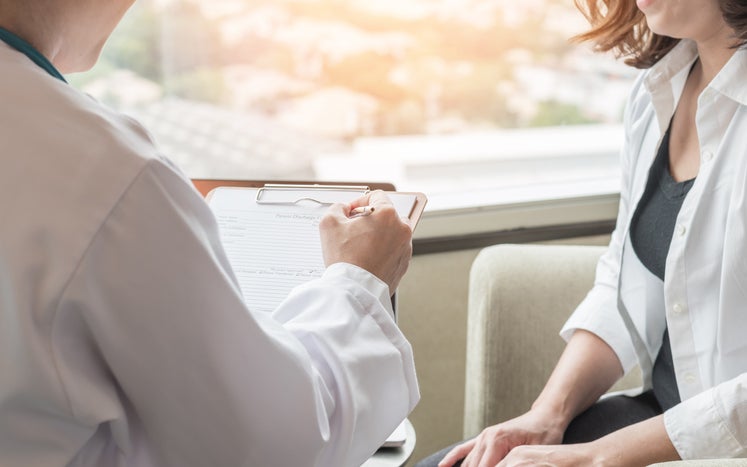Understanding your breast cancer risk
October 21, 2025
By: Emma Nelson
Categories: Cancer, Women's Health
Tags: breast cancer risk, high-risk breast cancer, genetic breast cancer, breast cancer prevention
Breast cancer affects 1 in 8 women over their lifetime. Understanding your personal risk can make a meaningful difference in prevention and early detection.
Kelly Jensen, PA-C, high-risk and genetics coordinator at Trinity Health Breast Center – Lakes Village in Norton Shores, shares expert insights on what it means to be “high risk” for breast cancer and how women can take proactive steps toward breast health and early detection.
What does “high risk” really mean?
The average woman’s lifetime risk of breast cancer is about 12.5%. However, some women face significantly higher risks due to factors such as family history, menstrual history, prior abnormal biopsies and lifestyle choices.
“High risk doesn’t mean you’ll get breast cancer,” says Kelly. “But it does mean we need to be more proactive in how we monitor and manage your health.”
How can women learn their risk?
Trinity Health Breast Center – Lakes Village and Trinity Health Grand Rapids Breast Center offer a specialized program called RiskPlus™, which provides a comprehensive review of each woman’s personal and family history, lifestyle and other medical factors. From there, a personalized care plan is developed. This may include advanced imaging and risk-reduction strategies for breast cancer prevention.
“RiskPlus™ is about empowering women with knowledge,” Kelly explains. “We take the time to understand each person’s unique story and build a care plan that fits.”
Lifestyle factors that matter
Certain lifestyle choices can increase breast cancer risk — but the good news is, many of these are modifiable. Weight, physical activity, diet, tobacco use and alcohol consumption all play a role.
Small changes, such as walking more or reducing alcohol intake, can have a meaningful impact on your risk.
Read: Breast cancer symptoms and risk factors
Specialized care for women at high-risk
Women at high risk may benefit from additional screenings, including breast MRI, genetic counseling and preventive medications. Our breast care team follows national guidelines to ensure each woman receives the most appropriate care for her risk level.
Trinity Health Breast Center – Lakes Village is proud to be a NAPBC (National Accreditation Program for Breast Centers) accredited facility. It is also a Certified Quality Breast Center of Excellence, accredited by NQMBC (National Quality Measures for Breast Centers). It’s one of only 36 centers nationwide with this certification — and one of just two in Michigan, alongside the Trinity Health Grand Rapids Breast Center.
The center offers comprehensive, patient-centered care — all in one location.
Read: Grand Rapids patient thought it was a cyst, not breast cancer
Watch Kelly’s interview on Fox17 for more details on understanding your breast cancer risk.



